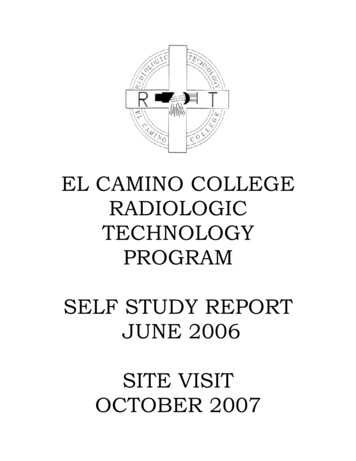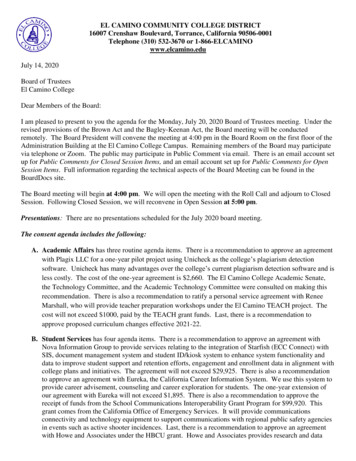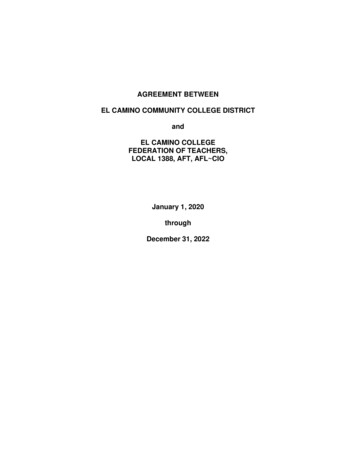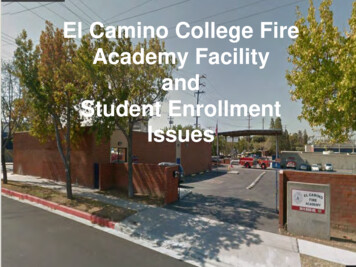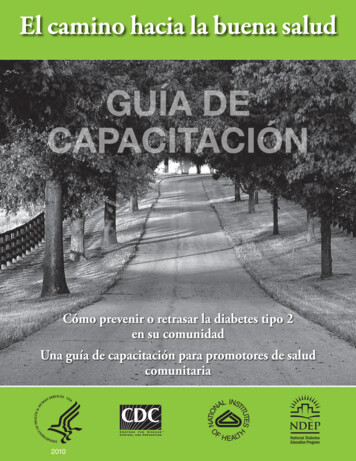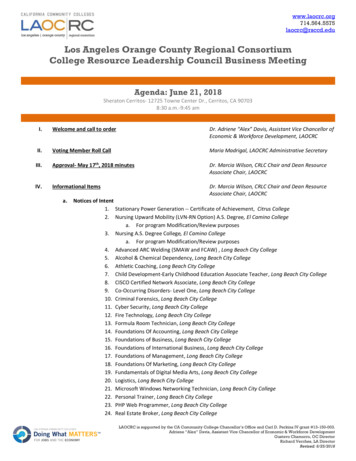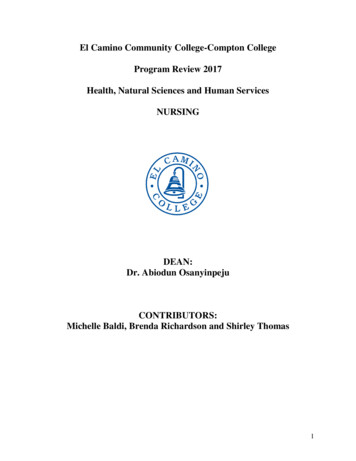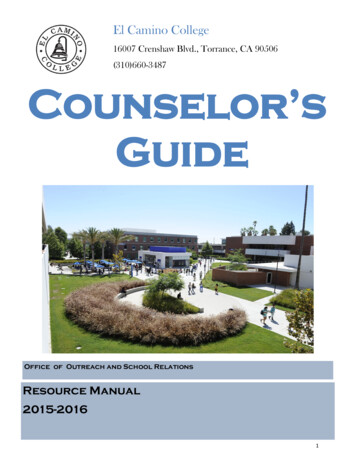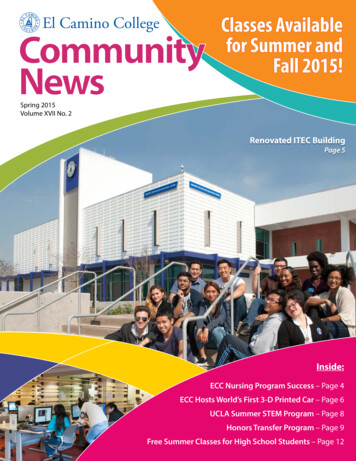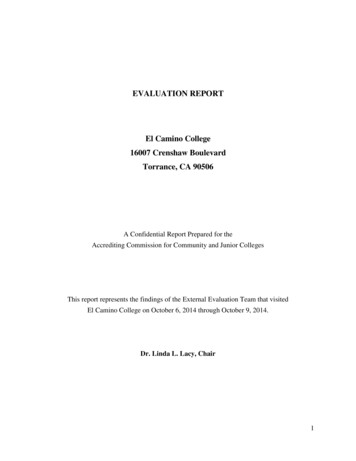
Transcription
EVALUATION REPORTEl Camino College16007 Crenshaw BoulevardTorrance, CA 90506A Confidential Report Prepared for theAccrediting Commission for Community and Junior CollegesThis report represents the findings of the External Evaluation Team that visitedEl Camino College on October 6, 2014 through October 9, 2014.Dr. Linda L. Lacy, Chair1
Date:February 6, 2015Institution:El Camino College16007 Crenshaw BlvdTorrance, CA 90506Team Report:Comprehensive Evaluation ReportThis Report represents the finding of the External Evaluation TeamThat visited El Camino College October 6-9, 2014.Subject:Commission Revision to the Team ReportThe comprehensive External Evaluation Report (Team Report) for El Camino College providesdetails of the team’s findings with regard to the College’s policies, procedures, and practices anddeficiencies in those policies, procedures, and practices which the team concluded led tononcompliance with Accreditation Standards. The Report should be read carefully and used tounderstand the team’s findings. Upon a review of the Team Report sent to the College, and theInstitutional Self-Evaluation Report and corrections of fact submitted by the College, thefollowing changes or corrections are noted by the Commission for the Team Report:Concerning the evaluation team’s Recommendation 4: Board and Administrative Organization,the Commission found that this recommendation is a recommendation for improvement, and ithas been changed and renumbered Recommendation for Institutional Improvement 10.Other minor corrections of fact and of inconsistent numbering of recommendations were madebased on a letter sent by El Camino College to the Commission after the Team Report wasfinalized by the Chair and after the Commission’s review of the El Camino College letter and theteam report.2
List of Team MembersDr. Linda L. Lacy (Chair)Superintendent/PresidentCerritos CollegeMs. Andrea Wittig (Team Assistant)Assistant to the Superintendent/PresidentCerritos CollegeDr. Rachel MayoDean, Education Centers & Online andInnovative LearningCabrillo CollegeDr. Anthony E. BeebePresident/CEOSan Diego City CollegeDr. Jamey NyeAssociate VP of Instruction and StudentLearningCosumnes River CollegeMs. Frankie L. HarrissVice President for Institutional Effectivenessand Quality AssuranceCollege of Micronesia-FSMDr. G.H. JavaheripourVice President of Administrative ServicesVictor Valley CollegeDr. Celia Cruz-JohnsonReading Instructor/CoordinatorSan Jose City CollegeMs. Susan KazamaHead LibrarianKapiolani Community CollegeDr. Rick SantosInstructor, Linguistics/ESLFresno City CollegeDr. Leta B. StagnaroVice President Academic Affairs/DeputySuperintendentOhlone CollegeDr. Angelica L. SuarezVice President Student AffairsSouthwestern CollegeDr. James Van TasselInstructorMission College3
Summary of the Evaluation ReportINSTITUTION:El Camino CollegeDATES OF VISIT: October 6-9, 2014TEAM CHAIR:Dr. Linda L. LacySuperintendent/PresidentCerritos CollegeA team of thirteen professional educators visited El Camino College October 6 throughOctober 9, 2014, for the purpose of evaluating the College’s compliance with AccreditationStandards, with Eligibility Requirements and Commission policies: to write an ExternalEvaluation Team Report for consideration by the Commission in reviewing the institution’sapplication for reaffirmation of accreditation: to make recommendations to the college forquality assurance and for increasing institutional effectiveness; and to submitrecommendations to the Accrediting Commission regarding the College’s accreditationstatus.In preparation for the visit, the team chair participated in an Accrediting Commission forCommunity and Junior Colleges (ACCJC) training session for chairs. Team membersattended an all-day training session on September 11, 2014 conducted by Commissionpersonnel, and studied Commission materials designed for visiting teams. In addition, teammembers reviewed the Institutional Self Evaluation, including the recommendations from the2008 Comprehensive Visit, Certification of Continued Compliance with EligibilityRequirements, Commission Policies, and other college reports since the last comprehensiveevaluation in 2007.The team chair and the assistant visited the College on August 25, 2014, and met with theSuperintendent/President and the Accreditation Liaison Officer. The team chair also visitedthe El Camino Compton College Education Center on September 30, 2014, and met with theChief Executive Officer of the Compton Community College District (CCCD),Superintendent/President, and Accreditation Liaison Officer.Prior to the visit, the team completed written assessments of the College’s Self EvaluationReport, prepared lists of individuals and groups with whom they wanted to meet, and beganreviewing the evidence cited. The members also began developing questions for Collegepersonnel and requests for additional evidence. On the day before the formal visit, the teamheld an organizational meeting to discuss strategies for interviews, met with the CollegeAccreditation team, and received a tour of the El Camino College campus.The visiting team began its on-site work on October 7. Team members interviewed over 126faculty, staff, administrators, students, and board members; conducted three open forums;visited classrooms, learning labs on El Camino College and the Compton Education Center;and reviewed all pertinent documents supporting the Self Evaluation report. The team roomwas very comfortable and the staff were helpful in assisting members with technology needs.The visiting team found that the Institutional Self-Evaluation report was concise, wellorganized, and contained evidence which demonstrated how all Accreditation Standards,Commission policies, and Eligibility Requirements were met. Concerns were voiced that4
Compton Center was not discussed in several areas of the report which led the team to havemany unanswered questions regarding the structure and relationship with El Camino College.The team conducted several interviews and resolved the majority of its questions. A fewteam members noted that the numbering of evidentiary documents and the listing of sourcesof evidence within the document was somewhat confusing. This issue was resolved withsupplementary information. It was also noted that areas of the College’s Website wereoutdated.The history of the institution, its mission, demographic information, research data,educational programs, rubrics for institutional effectiveness, program review, and studentlearning outcomes were included in the self-evaluation. The visiting team found that theCollege has responded thoroughly to the previous team’s recommendations. The institution’scontinued accomplishments as they pertain to planning agendas were well documented. Themanner in which the institution conducts its program review is currently embedded into thefabric of the institution, and the College collects and utilizes data and research on studentachievement and progress throughout the institution’s educational programs.The team found El Camino College to be in compliance with Eligibility Requirements andCommission Policies, only citing a deficiency with regard to ER 19. The Collegedemonstrated evidence that they had submitted follow-up reports to ACCJC in a satisfactoryand timely manner.El Camino College and Compton Education Center have made tremendous progress since thelast Accreditation visit by addressing the Standards and deficiencies identified. The teamfound that Compton Center is aligning with the Standards and is preparing to submit reviewof Eligibility Requirements to the ACCJC. The ECC Board of Trustees is slated to approvethis item at an upcoming board meeting.The team found that the College has responded to all previous recommendations with theexception of (2008) Recommendation 1. The team has written a recommendation that theCollege complete its integrated planning cycle; include purposeful dialogue; clearly tieresources to goals; clarify how priorities are decided; and communicate with stakeholders.(See 2014 Recommendation 1 below.)(2008) Recommendation 1: As cited in previous (1990, 1996, and 2002) accreditationrecommendations the college should complete the full implementation of its process fortracking planning, program review, budgeting, and evaluation process and complete the cycleto assure that all the departments and sites (including the ECC Compton Center) of thecollege participate in the program review process, and that the results of program reviewclearly link to institutional planning and the allocation of resources. (I.B.3; I.B.3; II.A.2.e;II.A.2.f; III.B.1; III.B.1.a; III.B.2.a; III.b.2.b)5
IntroductionEl Camino Community College District was established in 1946 and currently serves thecommunities of El Segundo, Torrance, Manhattan Beach, Redondo Beach, Hermosa Beach,Hawthorne, Inglewood, and Lennox, which represents approximately 533,000 residents.In August of 2006 following revocation of former Compton College’s accreditation inalignment with the provisions outlined in AB 318, El Camino College signed an MOU whichestablished an educational center within the CCCD. Compton College became El CaminoCollege Compton Education Center. Compton Center serves the communities of Lynwood,Paramount, and Willowbrook and portions of Athens, Bellflower, Carson, Downey,Dominguez, Lakewood, Long Beach, and Southgate.El Camino College has enjoyed a stable administrative staff. The currentSuperintendent/President is the fifth superintendent/president serving in that capacity since1995. Compton Community College District appointed a permanent Center CEO in July of2013, which was the second since the revocation of their accredited status.A five-member Board of Trustees oversees El Camino College’s policy and fiscal issues. Asoutlined in AB 318, Compton Community College District has a state appointed specialtrustee to oversee the fiscal and physical operations of the Compton District in place of anelected Board of Trustees to support the El Camino College Compton Center.The voters of the El Camino Community College District approved a 394 million facilitiesbond in 2002 and a 350 million facility bond in 2012. In 2002, the voters of CCCD alsoapproved a 100 million dollar facilities bond. The funds have been utilized to renovateexisting facilities, modernize instruction equipment, make necessary health and safetyrepairs, and complete construction of additional buildings.The College currently employees 1,150 full-time and part-time faculty teaching transfer andcareer training courses, which constitute 94 degrees and 87 certificates. El Camino Collegereported annual enrollment in 2012-13 to be 31,713 students. El Camino College ComptonCenter reported annual enrollment in 2012-13 to be 13,940 students. Both institutions haveexperienced enrollment declines in recent years. El Camino College has experienced adecline in enrollment since the 2008-09 academic year and the Compton Center hasexperienced an enrollment decline since 2010-11 academic year.El Camino College serves a diverse student body, the most represented ethnicities being 44%Latino, 18% Black, 16% Asian, and 15% White. El Camino College Compton Center’sstudent body make-up is 45% Latino, 37% Black, 8% Asian and 5% White. Females makeup 53% of the student population at El Camino College while Compton Center has 63%female population.Team members found the Institutional Self Evaluation report to be concise and organized,and it contained evidence which demonstrated how Accreditation Standards, Commissionpolicies and Eligibility Requirements were met. Concerns were voiced that Compton Centerwas not discussed in several areas resulting in many unanswered questions regarding thestructure and relationship with El Camino College. It was noted that some evidence wasdifficult to locate.6
The team confirmed that there was broad participation in the development of the report. Themajority of the authors and contributors were introduced to the team at the Meet and GreetReception. Prior to the visit, team members completed all assignments and were wellprepared for the visit due in large part to the preparations made by El Camino College.El Camino was very well prepared for the visit and exhibited great hospitality to the team.The team recognized the quality of students involved in the Student Ambassador programwho served as tour guides for the team. The team also recognized the excellent serviceprovided by the police cadets.The team reviewed the prior Accreditation Recommendations and actions. As the result ofthe 2008 accreditation visit, El Camino College was placed on Warning with ninerecommendations and two Commission Concerns. The following is a synopsis of theprocesses followed to attain Reaffirmation of Accreditation and removal from Warningstatus.In October of 2008, El Camino College (ECC) participated in a comprehensive Accreditationreview. In January 2009, the Commission acted to issue the status of Warning to the Collegebased on 9 Recommendations for Deficiency and 2 Commission Concerns. The College wasrequired to prepare two Follow-Up reports; the first was due on April 1, 2009 and thedirection of the Commission was to “demonstrate efforts toward resolution” ofRecommendations 1 and 3.The second Follow-Up report was due October 15, 2009 which requested resolution toRecommendations 1, 2, 3, 4, 6, 7, 8, and 9. At its June 2009 meeting, the Commissionaccepted the April 2009 report but continued the status of Warning. On October 27, 2009, athree-person team visited ECC and on January 29, 2010, the Commission took action toremove the College from Warning and reaffirmed Accreditation based on the Follow-Upreport of October 15, 2010, and corresponding visit. The Commission requested that ECCaddress the resolution of partially fulfilled Recommendation 1, 2, 5, and 6.In November 2011, ECC submitted a Follow-Up Report and a College visit. TheCommission took action in January 2012 requiring an additional Follow-Up report and visitin October 2012. The Commission granted the College additional time to correct deficienciesfor “good cause.”A three-member team visited the College on November 14, 2012. The Commissionconsidered the Follow-Up report and the report of the evaluation team in January 2013. TheCommission acted to issue Warning and required ECC to submit a Follow-Up Report byOctober 15, 2013.On November 14, 2013, a Commission representative conducted a site visit to ECC. At theJanuary 7-10, 2014, Commission meeting, action was taken to remove ECC from Warning.The visiting team determined that the College has put forth substantial efforts to meet theAccreditation Standards, Eligibility Requirements, and Commission Policies.7
Recommendations/CommendationsRecommendations to Address DeficienciesRecommendation 1: Institutional Effectiveness and Leadership and GovernanceIn order to meet the Standard and Recommendation 1 from the 2008 Evaluation Report, theteam recommends the College complete its integrated planning cycle by ensuring theplanning process offers opportunities for purposeful dialogue in which stakeholdersparticipate in the exchange of different points of view and reflections; clearly ties resourceallocation to the planning goals; clarifies how priorities are decidedand decisions are communicated to stakeholders, leading to genuine communication. Theteam recognizes that the College has done a great deal of work addressing the previousRecommendation (ER 19, I.B.3, I.B.4, I.B.6, II.A.2.f, II.B.4, III.C.2, III.B.1.a, III.D.1.a,IV.A.3).Recommendation 2: Financial ResourcesIn order to meet the Standard, the team recommends that El Camino Compton EducationalCenter implement the fiscal management plan to assure financial integrity and disseminatedependable and timely information for sound financial decision making (III.D.2).Recommendation 3: Planning and Decision-Making ProcessesIn order to meet the Standard, the team recommends that the College implement theplanning, governance and decision-making process outlined in board policies and “MakingDecisions at El Camino College,” a document that explains to the College community thestructures, relationships and philosophy for making inclusive, data-driven and wellcommunicated decisions through collegial consultation; regularly evaluate the process toensure integrity and effectiveness; communicate the results of the evaluation; and utilize theresults for improvement (I.B.4, I.B.6, IV.A.1, IV.A.2.a, IV.A.3, IV.A.5, IV.B.1.b).8
Recommendations for Institutional ImprovementRecommendation for Institutional Improvement 1In order to increase effectiveness, the team recommends the College complete thedevelopment and implementation of measurable objectives for the strategic initiatives,institutional effectiveness outcomes, and student achievement standards (I.B.3, I.B.4, I.B.6,I.B.7).Recommendation for Institutional Improvement 2In order to increase effectiveness, the team recommends El Camino Compton EducationCenter address student access for the diverse population reflected in the Center’s service areaand student population which ensures that the institution recruits and enrolls diverse studentswho reflect the community it serves (II.B).Recommendation for Institutional Improvement 3In order to increase effectiveness and to ensure that the institution’s enrollment managementgoals are achieved, the team recommends a stronger alignment between the Outreach Planand the Enrollment Management Plan (II.A.1, II.B).Recommendation for Institutional Improvement 4In order to increase effectiveness and in order to ensure equitable access to programs andservices to students regardless of location or delivery, the team recommends the Collegeaddress the provision of essential online support services (electronic student planningmodule), health services, and expanded wireless capability for students attending theCompton Education Center (II.B, II.B.1, II.B.3.a, III.C).Recommendation for Institutional Improvement 5In order to increase effectiveness, the team recommends the College develop and implementa plan to digitize student records currently stored in hard copies, as noted in their actionableimprovement plan (II.B.3.f.).Recommendation for Institutional Improvement 6In order to increase effectiveness, the team recommends the College coordinate studenttutorial and learning programs to ensure uniformity in tutor training and standardize themethod of assessment of the effectiveness of their learning support services (II.C.2).Recommendation for Institutional Improvement 7In order to increase effectiveness, the team recommends El Camino College ComptonEducation Center implement the Compton Facilities Master Plan for improvements to agedand non-functional buildings that support the educational plan and provide a physicalenvironment conducive to teaching and learning (III.B.1, III.B.1.b).9
Recommendation for Institutional Improvement 8In order to increase effectiveness, the team recommends the College clarify the mission,scope, and relationship of the College’s Technology Committee to its Academic TechnologyCommittee (III.C.1).Recommendation for Institutional Improvement 9In order to increase effectiveness, the team recommends that the Board of Trustees completea process for the selection of a Superintendent/President as stated in Board Policy 2431.(IV.B.1).Recommendation for Institutional Improvement 10In order to increase effectiveness, the team recommends the College implement a process forthe evaluation of policies and procedures according to an identified timeline and the Board ofTrustees revise the policies as necessary (II.B.2.a, II.B.2.b, II.B.2.c, II.B.2.d, IV.B.1.b,IV.B.1.e).Recommendation for Institutional Improvement 11In order to increase effectiveness, the team recommends the College develop procedures totrain fiscal employees to strengthen accounting and fiscal procedures as indicated in eachinstitution’s audit findings. (III.D.3)10
CommendationsCommendation 1El Camino College Compton Education Center is to be commended for exceptionalleadership and extraordinary efforts of the faculty, staff and administration in addressinginstitutional challenges and supporting student learning and achievement.Commendation 2El Camino College is to be commended for supporting the efforts of El Camino ComptonEducation Center to ensure continuity of educational services to the Compton community.Commendation 3El Camino College is to be commended for the diversity, breadth, and depth of learningsupport services and vibrant student life.Commendation 4El Camino College is to be commended for the remarkable student Ambassador Program andCollege Police Cadet program. These students represented the College proudly with theirlevel of knowledge, enthusiasm, and individual stories of success.Commendation 5El Camino College, particularly members of the Assessment of Learning Committee andCollege Curriculum Committee, is to be commended for its comprehensive and meaningfulwork on student learning outcomes development and assessment at the course, program, andinstitutional levels.Commendation 6El Camino College is to be commended for creating an engaging and supportive distanceeducation learning environment that values student learning and success.Commendation 7El Camino College is to be commended for exceptional collaboration between librarians andinstructional faculty who have instilled information competency skills in all English coursesdesigned to increase student learning and meet Institutional Learning Outcome #6.11
EVALUATION OF INSTITUTIONAL RESPONSES TO PREVOUSRECOMMENDATIONSRecommendation 1As cited in previous (1990, 1996, and 2002) accreditation recommendations the collegeshould complete the full implementation of its process for tracking planning, programreview, budgeting, and evaluation process and complete the cycle to assure that all thedepartments and sites (including the ECC Compton Center) of the college participate in theprogram review process, and that the results of program review clearly link to institutionalplanning and the allocation of resources. (I.B.3; I.B.3; II.A.2.e; II.A.2.f; III.B.1; III.B.1.a;III.B.2.a; III.b.2.b)The College met this Recommendation in 2010; however, the team recommends the Collegecomplete its integrated planning cycle; include purposeful dialogue; clearly tie resources togoals; clarify how priorities are decided; and communicate with stakeholders.Recommendation 2The college should immediately define and publish a timeline in respect to how it willdevelop and implement student learning outcomes at the course, program and degree levels,establish systems to assess student learning outcomes and use the results of such assessmentsto make improvements in the delivery of student learning, to ensure the College shall attain,by 2012, the level of Proficiency in the ACCJC Rubric for Evaluating InstructionalEffectiveness—Part III: Student Learning Outcomes. The college should immediatelyimplement processes to communicate to students expected student learning outcomes incourse outlines, course syllabi, college catalog and/or other effective channels (II.A.1.a;II.A.1.c; II.A.2.a-b; II.A.2.f; II.A.6)The College has met this Recommendation. A timeline for developing and implementingstudent learning outcomes was created by the Assessment of Learning Committee, andfaculty regularly assess their learning outcomes to make improvements in student learning.The College is on a four-year cycle in conjunction with the program review cycle. TheCollege is communicating the expected student learning outcomes to students via the coursesyllabi. The visiting team in fall 2013 determined that the College had met thisRecommendation and was at the level of proficiency. The 2014 team determined that theCollege is at the level of Sustainable Continuous Quality Improvement.Recommendation 3The college should revise its curriculum review processes and cycles so that all curriculumacross the college is reviewed consistently, that the cycle of review assures the currency ofthe curriculum, and that the curriculum review and program review processes are integratedso that an important element of program review (the determination that program curriculumneeds revision, addition or deletion to remain current) will be part of the actual programreview process. (II.A.2; II.A.2.a; II.A.2.b; II.2.A.2.c; II.2.A.2.d; II.A.2.e)The College has met this Recommendation. The College has integrated the curriculumreview and program review processes. The six-year cycle of review assures the currency ofthe curriculum. Program review, course review, and curriculum planning are all closelyrelated and linked. Course review reports are updated by the College Curriculum Committeeand the Office of Academic Affairs.12
Recommendation 4The College needs to assure that online courses and programs are consistent in meeting thesame level of rigor as on campus programs, that all services available on campus areavailable online, that student learning outcomes are incorporated into these offerings andthat this information is clearly communicated to students taking these courses. (II.A.1.b;II.A.2; II.A.2.a.2; II.A.6; II.A.7)The College has met this Recommendation. El Camino College has implemented AdministrativeProcedure 4105 that ensures that all courses, regardless of modality, are reviewed and acceptedindividually. The College Curriculum Committee follows the same process and approvalmeasures. In 2010, the College submitted a substantive change request to acquire approval for theonline course offerings. In 2012, approval was granted and areas concerning rigor were resolved.Distance Education (DE) is taken very seriously and the Curriculum Committee certifies thatthe same standards apply to DE courses as are applied to traditional courses; the Collegeverifies and authenticates students who register in a DE course are the same students whoparticipate in the course; and success rates are regularly analyzed against traditional coursesto ensure quality. Instructors are required to have training before they can begin teaching anonline or hybrid course.Recommendation 5El Camino College and the ECC Compton Center need to fully integrate SLO assessmentinto the faculty evaluation process. The ECC Compton Center must implement its facultyevaluations and use the results of these evaluations to encourage instructional improvementsand faculty development plans. (III.A.1.b; III.A.1.c)The College has met this Recommendation. Student Learning Outcomes assessment isintegrated into the self-evaluation component of faculty evaluations that documentassessment, reflection, and changes to pedagogy. Faculty members undergoing thecomprehensive evaluation process at the ECC Compton Center prepare a portfolio containinga self-evaluation, student learning outcomes, and assessment strategies.Recommendation 6El Camino College must develop a fiscal management plan at all sites, matched to itsrevenues, to assure the fiscal soundness of the institution. (III.D.2.c, III.D.2.d, III.D.2.g;III.D.3)The College has met this Recommendation. The District has developed five-year financialplans for each site to monitor its revenue and expenditures. The College and Center presentedhealthy ending balances during the past three fiscal years. Each has established an OPEBtrust and funded its UAAL. The Compton Center hired fiscal managers to improve its budgetdevelopment and fiscal management capacities.13
Recommendation 7El Camino College should develop a staffing plan for all sites which assures the effectivenessof human resources, includes written criteria for all personnel, and assigns individuals toduties appropriate to their expertise and the needs of the institution (III.A.1.a, III.A.1.b).The College has met this Recommendation. A staffing plan was written and approved as part ofthe Master Plan in 2009. The College adheres to hiring guidelines and continues to submitstaffing needs via the program review that ties planning to budget allocation. The College isaware of staffing issues it will face in all areas due to retirement and turnover and has analyzedits needs, but continues to face difficulties as Compton Center’s enrollment continues to grow,and shows a continual need for staffing. Critical management positions at Compton Center werefilled with qualified hires and staffing decisions are reviewed on a regular basis.Recommendation 8El Camino College must develop a facilities master plan for all sites, linked to educationalplanning, and integrate this plan with the institution’s overall planning process (III.B.I.a,III.B.2.a, III.B.2.b).The College has met this Recommendation. A facilities master plan was developed for ElCamino in 1998, updated in 2004, and again in 2008 to include Compton Center. The MasterPlan for both sites was update in 2012.Recommendation 9The El Camino College Board of Trustees must include in its code of ethics a clearly definedpolicy for dealing with behavior that violates this code. (IV.B.h)The College has met this Recommendation. The Board of Trustees on July 20, 2009, adopteda revision to Board Policy 2715, Code of Ethics/Standards of Practice, which includes aclearly defined policy for dealing with behavior that violates this code. The policy has beenpublished on the College website.Commission Concern 1El Camino College should reevaluate its online course offerings and submit substantivechange proposals where 50% or more of a program can be achieved online. (ER 21,Substantive Change Policy) The College may risk losing federal financial aid for programsthat have not received substantive change approval.The College submitted a substantive change proposal in 2010 and has obtained the necessaryapprovals to address this concern.Commission Concern 2El Camino College should shorten its timeline for program review so there is a mechanism tosupport a closer in
El Camino College 16007 Crenshaw Boulevard Torrance, CA 90506 A Confidential Report Prepared for the Accrediting Commission for Community and Junior Colleges This report represents the findings of the External Evaluation Team that visited El Camino College on October 6, 2014 through October 9, 2014. Dr. Linda L. Lacy, Chair
